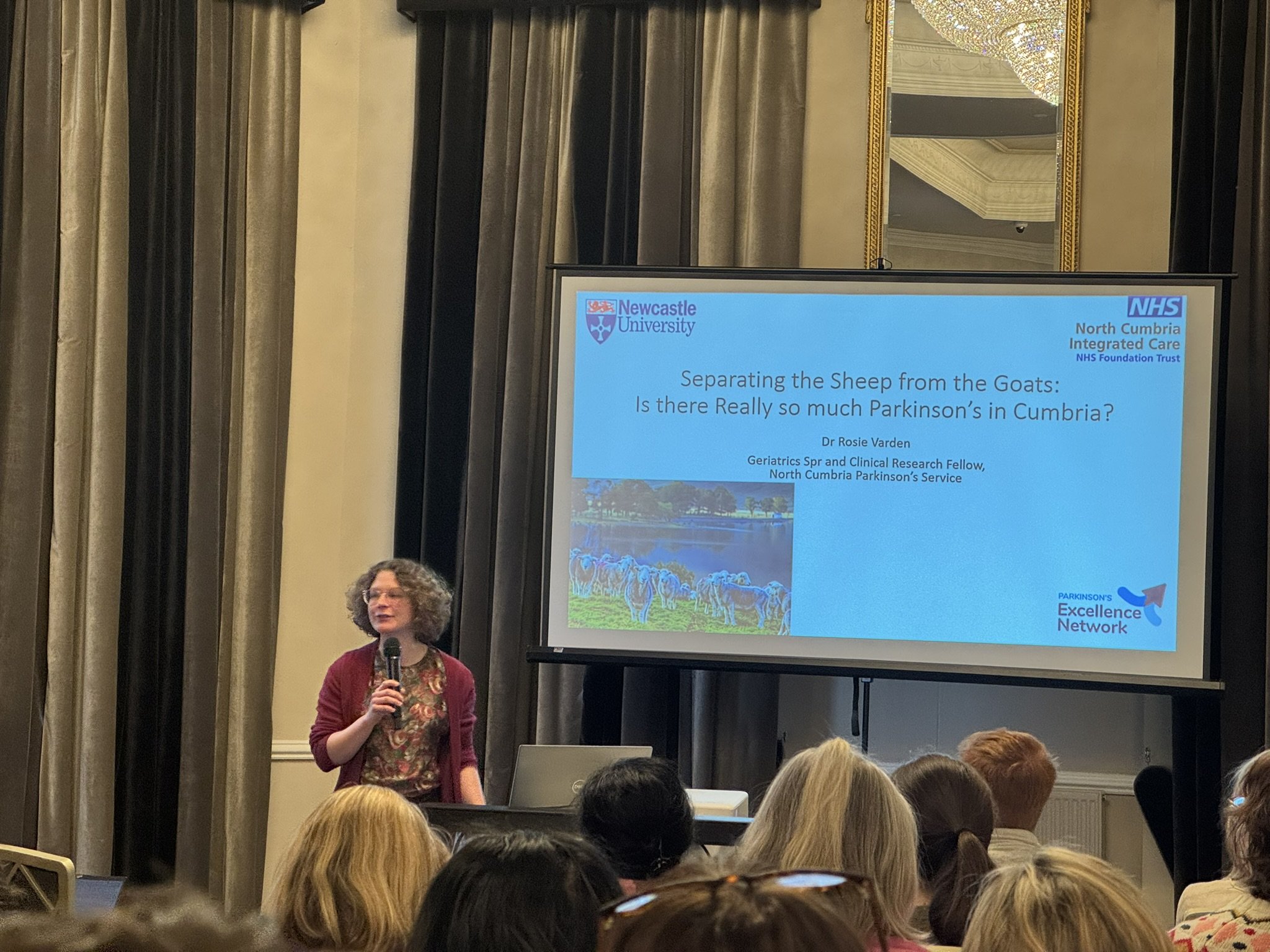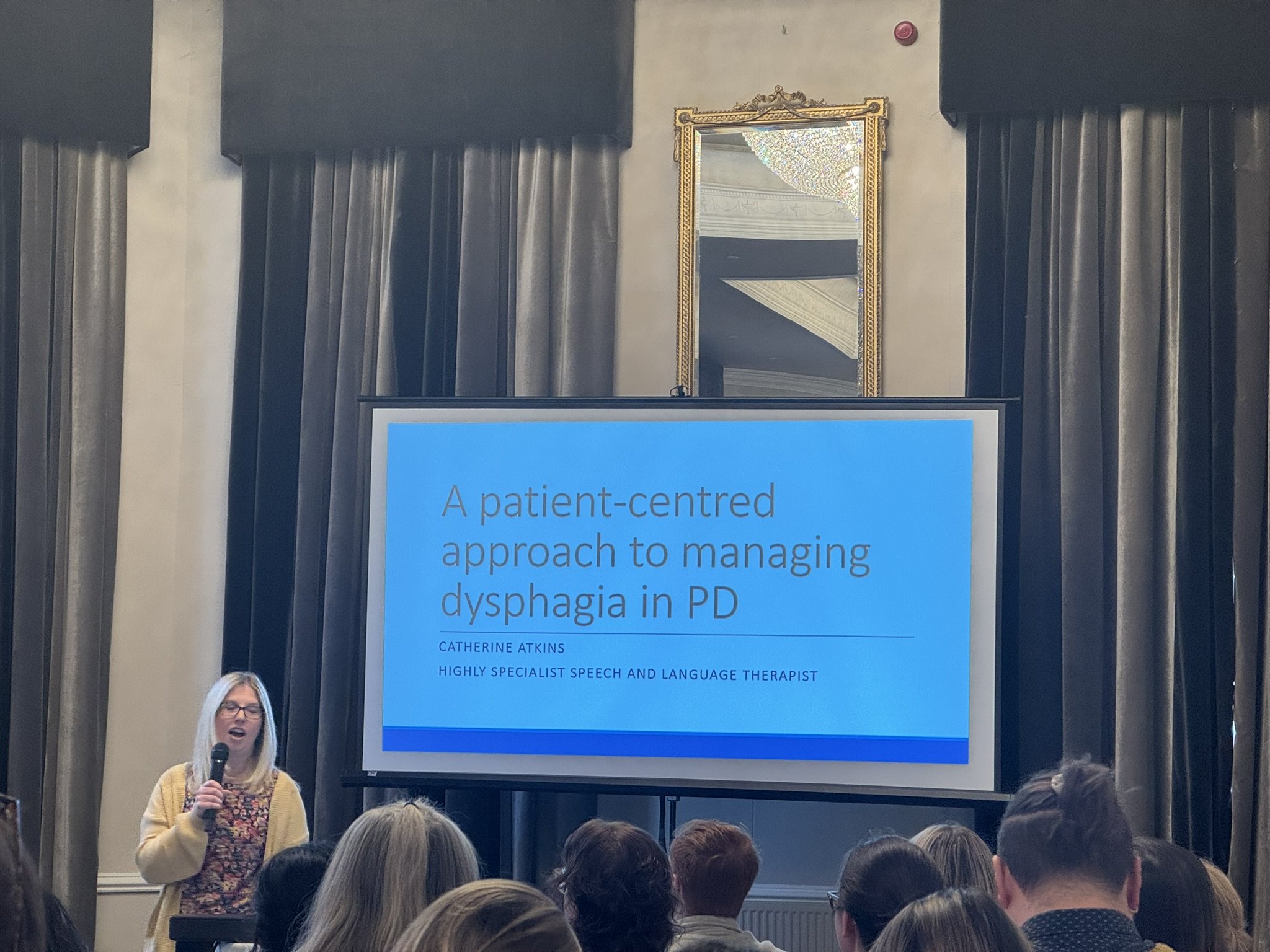The Three Rivers Parkinson’s Conference
Written by Sam Bowden and Sioobhan Munns, Psychology Placement Students, Newcastle University
In February, the Three Rivers Conference took place at the Hardwick Hall Hotel, Sedgefield. It brought together Parkinson’s researchers from across the Northeast to share the latest breakthroughs in the field. Among them was our team, the Brain and Movement research group, from Newcastle University, where we are completing a year-long placement as part of our Psychology degrees. Part of our placement is to learn about research. Here’s what we took away from the event.
The day began with Professor Oliver Bandmann, Professor of Movement Disorders Neurology from Sheffield University and Honorary Consultant Neurologist. He introduced his work on repurposing existing drugs for Parkinson’s treatment. Since 1993, he has been studying how problems with mitochondria (the energy producers in our cells) contribute to developing Parkinson’s. With this in mind, he set about finding ways of normalising mitochondrial function. He discovered that using a liver disease drug called Ursodeoxycholic Acid can improve the mobility of people living with Parkinson’s. This brings hope that existing medications could be used in new ways to help patients.
“Seperating the Sheep from the Goats: Is there Really so much Parkinson’s in Cumbria?”
By Dr Rosie Varden, Geriatric Registra & Clinical Resaerch Fellow, North Cumbria Parkinson’s Service
Next, Dr. Rosie Varden from the North Cumbria NHS Trust explored how common Parkinson’s is in different areas of Cumbria. By analysing medical records, she found that while urban and rural areas had similar rates, some regions had a much higher number of cases. This suggests that both genetics and environmental factors could play a role, which is an important lead for future research.
“A patient centred approach to managing dysphagia in PD?”
By Catherine Atkins, Highly Specialist Speech and Language Therapist, Newcastle upon Tyne Hopsitlas NHS Trust
After a coffee break was Catherine Atkins, Specialist Speech and Language Therapist, from the Newcastle upon Tyne Hopsitlas NHS Trust. She presented her research on managing dysphagia (swallowing difficulties) in Parkinson’s. With 80% of patients developing dysphagia, the need for proper care focused on food intake is imperative. If not properly managed, it can potnetially lead to serious complications. She stressed the importance of balancing safety with quality of life when using thickened fluids.
Anxiety is something many people living with Parkinson’s will be familiar with. It can not only worsen symptoms but also lead to more hospital admissions. Dr Chris Lovegrove, Clinical Research Fellow in Pateint Safety and Consultant Occupational Therapist from Newcastle University, spoke to us about his approach to this issue. He is developing a new intervention which focuses on adapting the way people perform their everyday activities to improve everyday life. He has found this could help to people with Parkinson’s cope better and reduce anxiety or worry. His approach uses the experiences of those living with Parkinson’s. This ensures that the treatment is both practical and effective. With his findings, he hopes to develop a new study into improving care.
“Devloping an Occupation-Based Complex Intervention for Living Well with Anxity and Parkinson’s - the OBtAIN-PD study”
By Dr Chris Lovegrove, Clinical Research Fellow in Pateint Safety and Consultant Occupational Therapist, Newcastle University
Finally, Professor Michele Hu, Professor of Clinical Neuroscience and Consultant Neurologist from Oxford University, shared her work on categorising types of Parkinson’s. Her research showed that Parkinson’s doesn’t progress the same way for everyone, with different speeds and symptom patterns. By understanding these patterns, doctors can better predict how symptoms might evolve, enabling more personalised care to indiciduals. This research could also help develop future treatments tailored to each patient’s individual needs.
As the conference wrapped up, one thing was clear: Parkinson’s research is both thriving and accelerating. Every speaker spoke with vigour and optimism about the progress being made in understanding and treating this complex condition.
Special thanks to Sam Bowden and Siobhan Munns for writing their reflections on a very interesting and engaging Parkinson’s Three Rivers Conference!




